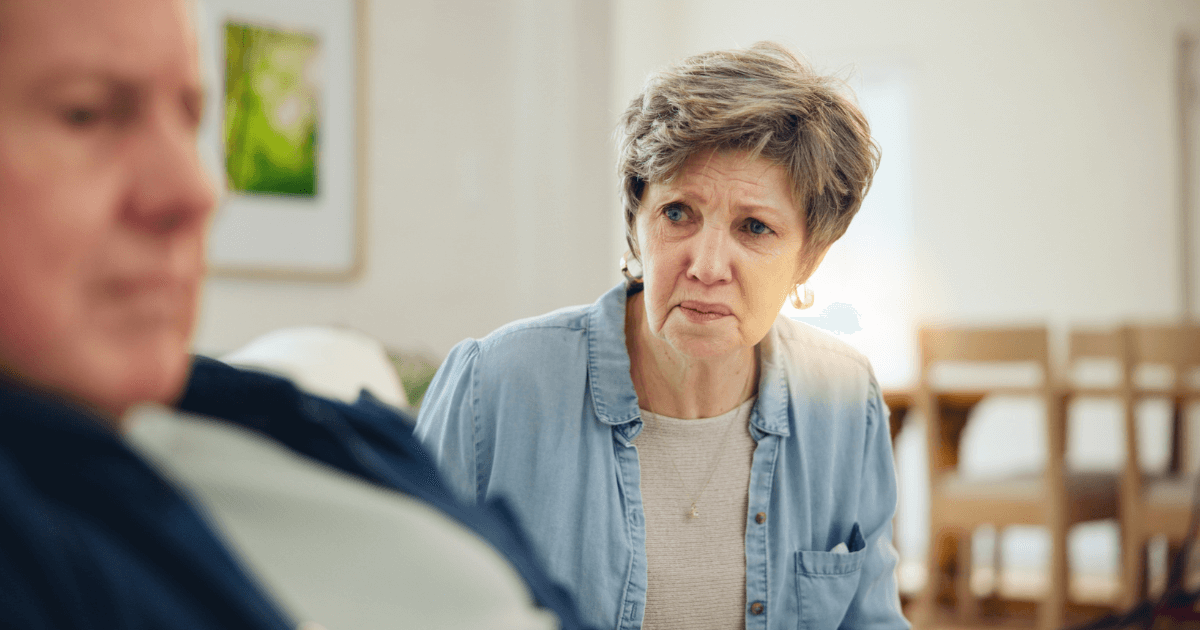As a mood disorder that affects the way we think, feel and act, depression in older adults can be a common problem but is not a normal part of aging.
Significant life changes and stressors can increase the risk for depression as we grow older. Those who experienced depression when they were younger may also be at increased risk. Unlike temporary feelings of sadness or melancholy, clinical depression can require intervention.
Risk factors for depression in older adults
These factors can influence a person’s likelihood of developing depression, even if they are not the cause:
- Biological factors: Changes in brain chemistry, neurological decline and physical health issues can directly influence mood and cognitive function, contributing to depression.
- Social isolation: Retirement, loss of peers and mobility issues can lead to decreased social interaction, fostering feelings of loneliness and isolation.
- Grief and loss: The loss of friends, family members and independence due to physical limitations can trigger prolonged grief and depression in older adults.
- Chronic pain and illness: Conditions such as arthritis, cancer, Parkinson’s disease and heart disease can cause significant pain and disability, leading to depression.
- Genetics: Those who have a family history of depression may be at greater risk.
- Stress: Life stresses or providing care for a loved one can increase the risk of developing depression.
- Lack of sleep: Individuals who struggle to get healthy rest or recharge with a good night’s sleep may be at higher risk of depression.
Source: National Institute on Aging
Symptoms of depression in older adults
Recognizing symptoms and not delaying an early diagnosis for depression is essential so early intervention or treatment can begin. Look for these signs that a loved one may be depressed:
- Persistent sadness or hopelessness: An ongoing sense of gloom that doesn’t go away could be a red flag.
- Withdrawal from social activities: If your loved one suddenly seems disinterested in hobbies or social engagements they once enjoyed, it may be a sign of depression.
- Changes in appetite or weight: Significant weight loss or gain without an apparent reason can indicate emotional distress.
- Sleep disturbances: Difficulty falling asleep, staying asleep or sleeping too much can all be symptoms of depression in older adults.
- Fatigue or loss of energy: A noticeable decrease in energy or motivation to engage in daily activities is a common sign of depression.
- Expressions of worthlessness or excessive guilt: Older adults may express feelings of worthlessness or undue guilt over past events.
Download our complimentary Memory Care Guide.
Depression in older adults: Steps families can take
Taking prompt supportive action can make a significant difference in your loved one’s well-being if you notice signs of depression:
- Start a conversation: Approach your loved one with empathy and concern. Express that you’ve noticed changes in mood or behavior and that you’re there for support.
- Encourage professional help: Depression is a medical condition that can be treated. Encourage your loved one to see a healthcare provider for an evaluation. Offer to accompany them to appointments if they’d like the support.
- Explore treatment options: Treatment may include counseling, medication or a combination of both. Be supportive and patient as your loved one explores these options with their healthcare provider.
- Promote social engagement: Encourage participation in community activities or events. Social interaction can be a powerful antidote to depression.
- Support physical health: Regular exercise, a nutritious diet and adequate sleep can improve mood and overall well-being.
Depression in older adults: Lifestyles that promote good mental health
While it’s not always possible to prevent depression in older adults, there are steps families can encourage that might reduce the risk of depression:
- Stay physically active: Regular physical activity can often reduce the risk of depression. Encourage activities that are enjoyable and suitable for their fitness level.
- Maintain social connections: Help your loved one stay connected with friends, family and community resources. Social support is vital for emotional health.
- Engage in meaningful activities: Encourage hobbies or volunteering, which can provide a sense of purpose and fulfillment.
- Promote cognitive stimulation: Activities like reading, puzzles and games can keep the mind engaged and reduce the risk of depression.
- Encourage routine: A structured daily routine can provide a sense of stability and purpose, reducing feelings of uncertainty and anxiety.
Depression in older adults: Available resources
There are several resources available for families and their loved ones, including their medical team, American Psychological Association and the National Coalition on Mental Health and Aging.
Depression in older adults is a serious but often treatable condition. Families can play a crucial role in supporting their loved ones by understanding the risk factors, recognizing the symptoms and taking proactive steps to address emotional well-being.
Depression in older adults: How senior living communities can help
Families often turn to the strong support and services communities can provide for those older adults who may have become isolated from friends and opportunities – or who haven’t been able to remain active or maintain a healthy diet.
In fact, the advantages you’ll find at an assisted living community can often help residents create a quality of life that contributes to physical and mental wellness, including:
- Private residences and accessibility
- Assistance with daily tasks while supporting independence
- Daily activities and social events
- Healthy dining and snacks
- Physical fitness exercises and classes
- Opportunities to meet and make new friends
- Events and common areas encouraging daily interaction
- Scheduled transportation
The Charleston Senior Living Community
Locally owned and operated, we offer personalized care by our dedicated team members. Setting a new standard in Assisted Living and Memory Care, we don’t define our residents by their limitations or illness but instead believe in focusing on the positive and the possibility.
The Charleston Senior Community includes private apartments for assisted living residents and for those living with Alzheimer’s or dementia. Your loved ones will benefit from our attention to detail, routine health assessments, delicious dining and daily activity programs as we support everyone to live their best life.
Consider a few of our amenities:
- Chef-led dining program
- Community movie theater
- Salon
- Ballroom
- Live entertainment
- Outdoor patio
- Social lounges
- Housekeeping
If you or your family is thinking about Assisted living or Memory care, we hope you will consider The Charleston Senior Community. We are a trusted resource and are here to answer any questions, contact us today.
We also invite you to download our complimentary Memory Care Guide to learn more about this type of senior living.









